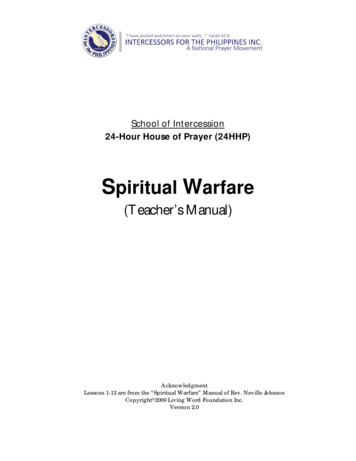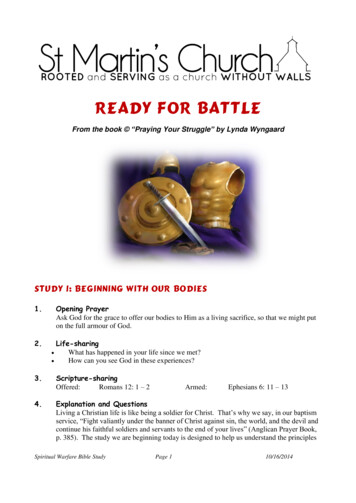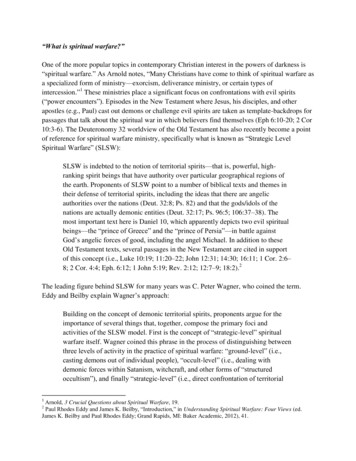
Transcription
S P I R I T UA LWA R F A R EVerse by verse commentary throughEphesians 6:10-20David Guzik
Enduring Word presents the Bible commentary of David Guzik.To support this work, go to:enduringword.com/ donations-enduring-word/No part of this publication may be reproduced, stored in a retrieval system, ortransmitted in any way by any means–– electronic, mechanical, photocopy, recording, or otherwise–– without the prior permission of the copyright holder,except as provided by USA copyright law.All scriptures quotations, unless otherwise indicated, are taken from the NewKing James Version of the Bible, copyright 1979, 1980, 1982, Thomas Nelson,Inc., Publisher. Translational emendations, amplifications, and paraphrases areby the author. 2017 The Enduring Word. All rights reserved.ISBN-13: 978-1-939466-37-2The Enduring Word5521 San Ardo Way,Santa Barbara, CA 93111
Table of ContentsIntroduction 2Finally 3Strong in the Lord 5Wasted Strength 7All the Armor 9Not Agaisnt Flesh and Blood 11Stand 13Beginning With Truth 15What to Put On 17Keep Your Boots On 19Having, Taking 21Stopping Flaming Arrows 23Hope and Salvation on Your Head25A Spiritual Sword 27Putting it into Action 29
SPIRITUAL WARFAREINTRO D U C TI ONIn producing this book, our desire is to help you be equipped for the very real spiritual warfare that you face each and every day. By studying this passage from Paul’s epistleto the Ephesians, we learn that there is an enemy lurking who seeks to use every craftymethod at his disposal to sidetrack you in your walk with God, sideline you in the work ofministry, and rob you of the joy of your salvation. But be of good cheer, because God hasgiven us His armor which, when employed by us, will make us able to stand against theattacks of our enemy.This book will take you through each verse of Ephesians 6: 10-20, where God teaches usboth, how to identify our enemy, and how to stand in His strength against spiritual attack.We hope that by learning these important truths, you will have victory in your walk withGod and experience greater joy in your relationship with Him.–David Guzik2
FinallyChapter 1FinallyFinally, my brethren, be strong in the Lord and in the power of His might.–Ephesians 6:10This verse begins the well-known and often quoted passage from the Apostle Paul dealingwith spiritual warfare and the whole armor of God. It’s a theme that has fascinated Christians for a long time, probably because it touches the life experience of most every follower of Jesus.One pastor captivated by the themes of this Ephesians 6 passage was named WilliamGurnall. Starting in 1655, he published his book The Christian in Complete Armour, anexplanation of Ephesians 6:10-20. In his dedication, he described his book as a “mite” anda “little present” but it takes up three volumes, 261 chapters, and 1,472 pages - all on theseeleven verses.I’m impressed by how Gurnall subtitled his book: The saint’s war against the Devil, whereina discovery is made of that grand enemy of God and his people, in his policies, power, seatof his empire, wickedness, and chief design he hath against the saints; a magazine opened,from whence the Christian is furnished with spiritual arms for the battle, helped on with hisarmour, and taught the use of his weapon; together with the happy issue of the whole war.That’s the full title, not the book itself.Our look at this passage certainly won’t compare to Gurnall’s work, but we can begin atthe beginning, noting that Paul began this section with the word, “Finally.”It obviously means that this comes at the end of the letter to the church in Ephesus - a letter in which Paul carefully established our place in Jesus, and then the basics of the Christian walk. This is his last section dealing with that walk.We can say it this way: The foundations for success in spiritual warfare (and our entire Christian walk) are the truths and principles brought to us in the previous sections3
SPIRITUAL WARFAREof Ephesians. Everything about our spiritual battle comes “finally,” in light of all thosethings.- In light of all that God has done for you.- In light of the glorious standing you have as a child of God.- In light of His great plan of the ages that God has made you part of.- In light of the plan for Christian maturity and growth He gives to you.- In light of the conduct God calls every believer to live.- In light of the filling of the Spirit and our walk in the Spirit.- In light of all this, there is a battle to fight in the Christian life.Before you launch out into spiritual battle, give attention to the basics, the foundations ofChristian living – who Jesus is and what He did for you. Building on those foundationsexplained from Ephesians 1:1 to 6:9, then we come the important subject of spiritual battle– but not before.4
Strong in the LordChapter 2Strong in the LordFinally, my brethren, be strong in the Lord and in the power of His might.–Ephesians 6:10It’s a wonderful phrase: “Be strong in the Lord and in the power of His might.” According to F.F. Bruce, Paul more literally wrote “strengthen yourselves in the Lord.” He probablytook the idea from 1 Samuel 30:6, where it is written that David “strengthened himself inthe Lord his God.”The detailed teaching of spiritual battle in this passage presents two essential components.First, you must “be strong in the Lord and in the power of His might.” Then, you must“put on the whole armor of God” (as it will say in the next verse). The two are essential,and much teaching on spiritual warfare neglects the first. If you take a weak man who canbarely stand and put the best armor on him, he will still be an ineffective soldier. He willbe easily beaten. So equipping for Christian combat must begin with “be strong in theLord and in the power of His might.”Before a soldier is given a gun or shown how to fire a missile, he or she goes throughbasic training. One great purpose for basic training is the build up the recruit’s physicalstrength. It is as if the army says, “Soldier, we are going to give you the best weapons andarmor possible. But first we have to make sure that you are strong, and that you can usewhat we give you.” To be effective in spiritual warfare, your spiritual strength must grow.“And in the power of His might.” This shows how to get this strength. This does not happen just by saying the words. It is not an incantation or a spell. You can’t just walk aroundsaying, “be strong in the Lord and in the power of His might” over and over and it willhappen. Christianity isn’t one of those self-help formulas where we simply say positivethings to ourselves. Those kind of mental games can accomplish something, but it certainly wasn’t what Paul meant here.5
SPIRITUAL WARFARE“Might” is inherent power or force. A muscular man’s big muscles display his might, evenif he doesn’t use them. It is the reserve of strength.“Power” is the exercise of might. When the muscular man uses his might to bend an ironbar, he uses his power. It means that the reserve of strength is actually in operation.God has vast reservoirs of might that can be realized as power in the Christian life. ButHis might does not work in me as I passively sit and do nothing. His might works in meas I actively rely on it, and step out to do the work. I can rely on it and do no work. I cando work without relying on it. But both of these fall short. I must rely on His might andthen do the work.It is not:- I do everything and God does nothing.- I do nothing and God does everything.- I do all I can and God helps with what I can’t.Each of those approaches falls short. The key is for me to by faith rely on His might - andrely on it more and more - and then do the work, seeing His power in action.6
Wasted StrengthChapter 3Wasted StrengthFinally, my brethren, be strong in the Lord and in the power of His might.–Ephesians 6:10It’s a wonderful, powerful statement from the Apostle Paul – an invitation for us to drawon the resources of God’s strength. That’s more than enough strength for any of us.Yet there is an aspect to this that we must think about. I first found this idea in the worksof the late Dr. Martyn Lloyd-Jones – an idea that is important to our ability to use theresource of God’s strength in our life.In his great series of sermons on this text, Dr. Lloyd-Jones listed many ways in which hebelieved Christians wasted their strength. It was as if they had received some of the available might of God, but it simply leaked away like water in a bucket full of holes.I don’t present this list to judge or condemn, but for your sober consideration. Read itover, and ask God what might apply to your life. These are some of the things MartynLloyd-Jones thought took away the strength of the Christian:- Committing to too many spiritual works or things- Too much conversation- Arguments, debates, wrangling- Laziness- Too much time in the wrong company- Too much foolish talk and joking- Love of money and career- A desire for respectability and image- An unequal partnership with an unbeliever- Ungodly entertainment- A wrong attitude toward or doubting the Word of God7
SPIRITUAL WARFARELloyd-Jones didn’t want this list to become a law, or a source of legalism and bondage. Hewrote: “We have to walk on a knife-edge in these matters; you must not become extremeon side or the other. But you have to be watchful. And, of course, you can always tell byexamining yourself whether your strength is increasing or declining.”Is your strength increasing or declining? It may be that you are receiving the strength ofGod, but wasting it. Talk to God about it.8
All the ArmorChapter 4All the ArmorPut on the whole armor of God, that you may be able to stand against the wiles ofthe devil. –Ephesians 6:11The Apostle Paul, inspired by God, began this section about spiritual warfare by telling usto “be strong in the Lord and in the power of His might” (Ephesians 6:10). After that wordto receive the strength of God, Paul explained the goal of our battle – “that you may beable to stand against the wiles of the devil.” We express the strength we have in God bystanding against the wiles of the devil. The schemes of our spiritual adversaries come tonothing when we stand against them in the power of God.Along the way, Paul told us to put something on – “put on the whole armor of God.” Ofcourse, Paul wrote using a metaphor, a word-picture. Just as a Roman soldier had armorthat made him ready to fight, so the follower of Jesus has spiritual resources and equipment that prepare him to survive and to win spiritual battles.This armor of God will be explained more fully in the next passage; but the emphasis hereis on “the whole armor of God.” God gives the believer a full set of spiritual equipment,and He sends us out into battle with everything we need at our disposal.This ancient Greek word for armor is used in only one other place in the New Testament.In Luke 11:21-22, Jesus spoke of the “strong man who is fully armed,” but is stripped of “allhis armor” when a stronger one comes and defeats him. We know that at the cross, Jesusdisarmed all spiritual authorities and powers that oppose us (Colossians 2:15).So we are to “put on the whole armor of God.” This armor is “of God” both is the sensethat it is from Him, and in the sense that it is His actual armor. In the Old Testament, it isthe Lord who wears the armor:For He put on righteousness as a breastplate,9
SPIRITUAL WARFAREAnd a helmet of salvation on His head;He put on the garments of vengeance for clothing,And was clad with zeal as a cloak. –Isaiah 59:17God now shares that armor with us - no wonder we are more than conquerors! (Romans8:37)In the book of 1 Samuel there is a story of a boy about to fight a battle, and a king gave theboy the king’s own armor to fight in. The armor must have been good, because it belongedto a king. Yet the boy didn’t want to fight in the king’s armor, no matter how good it was.The boy – who would later become a king himself – explained that he didn’t want to usethe king’s armor because he had not tested it (1 Samuel 17:29).The boy – named David, of course – went on to fight the battle against Goliath in armorthat he had tested before. David had trusted God to protect him, give him courage, and togive him skill in battle before. That trust was part of tested, proven armor for David, andhe won the battle against Goliath.The armor God gives you won’t be effective until you use it – until you test it. The moreyou use it, the more effective it will be. Just make sure you take the whole armor of God.10
Not Against Flesh and BloodChapter 5Not Against Flesh and BloodFor we do not wrestle against flesh and blood, but against principalities, againstpowers, against the rulers of the darkness of this age, against spiritual hosts ofwickedness in the heavenly places. –Ephesians 6:12Many followers of Jesus do not understand that our real battle is not against flesh andblood. They put all their efforts in that direction. Paul’s idea here is much the same as in 2Corinthians 10:3-4: “For though we walk in the flesh, we do not war according to the flesh.For the weapons of our warfare are not carnal but mighty in God for pulling down strongholds.”Then Paul described just whom we do battle against: “Against principalities, againstpowers, against the rulers of the darkness of this age, against spiritual hosts of wickedness in the heavenly places.” Paul used a variety of terms to refer to our spiritual adversaries. We should regard them as being on many different levels and of many different ranks,yet they all have one goal: to knock the Christian down from their place of standing.Ephesians 6:11 tells us that all of our warfare is combating “the wiles of the devil.” At theend of the day it is completely irrelevant if the particular opponent we face is a principality, a power, or a ruler of the darkness of this age. Collectively, they are all membersof “spiritual hosts of wickedness in the heavenly places.” They are all part of a spiritualarmy that is organized and established into ranks - and under the headship of Satan, thedevil, who comes against us with his wiles.We learn more about these principalities and powers from other passages in the NewTestament.- Romans 8:38 tells us that principalities cannot keep us from God’s love. Therefore, thereis a limit to their power.11
SPIRITUAL WARFARE- Ephesians 1:20-21 tells us that Jesus is in enthroned in heaven, far above all principalities and powers.- Colossians 1:16 tells us that Jesus created principalities and powers. Colossians 2:10 tellsus that Jesus is head over all principality and power. Therefore, Jesus is not the opposite ofSatan or principalities.- Ephesians 3:10-11 tells us that the church makes known the wisdom of God to principalities and powers.- 1 Corinthians 15:24 tells us that principalities and powers have an end; one day theirpurpose will be fulfilled and God will no longer let them work. Therefore, God has a purpose in allowing their work in the present age.- Colossians 2:15 tells us that Jesus disarmed principalities and powers at the cross.Therefore, our victory is rooted in what Jesus did, not in what we do. It isn’t that there is nodoing on our part - but our doing is the appropriation and application of what Jesus did.Understanding our spiritual adversaries – what they can and can’t do – is an importantpart of success in our struggle against them. In it all, remember: our adversaries in thisstruggle are not human, but spiritual – and Jesus has defeated them.12
StandChapter 6StandTherefore take up the whole armor of God, that you may be able to withstand inthe evil day, and having done all, to stand. –Ephesians 6:13Paul introduced the idea of “the whole armor of God” back in Ephesians 6:11. In thefollowing verses he details the specific items related to the armor of God. In this verse, hesimply states what the main purpose of spiritual warfare and the armor of God is.Simply said, we are given this spiritual armor so “that you may be able to withstand inthe evil day, and having done all, to stand.” This describes what we use the strength ofGod and the armor of God for.The primary picture in Paul’s mind is not that the Christian goes out attacking spiritualenemies. That concept may have its place in the Christian life, but that isn’t Paul’s thinkinghere.For this passage, instead of picturing an “army” of God’s people seeking out and attackingsome kind of demonic fortress, we are to have the idea that Jesus illustrated in His ministry. Jesus didn’t patrol around, looking for demons to conquer. That would almost allowdemons to set the agenda for His ministry. Instead, Jesus knew what God the Father wanted Him to do, He set about doing it, and He dealt with satanic opposition when it arose.When satanic opposition raised itself, Jesus stood against it and was not moved.So the idea is that God has given us a call, a mission, a course to fulfill. Satan will do hisbest to stop it. When he attacks and intimidates, we are to stand. It is plain that this isPaul’s emphasis in Ephesians 6:11 and 6:13. We love an energetic church that advances theKingdom of God so vigorously that it shakes the councils of hell, but we don’t let principalities and powers set our agenda. We do the Lord’s work and stand against every hint ofspiritual opposition.13
SPIRITUAL WARFAREGod gives the Christian a glorious standing to maintain by faith and spiritual warfare:- We stand in grace (Romans 5:2).- We stand in the gospel (1 Corinthians 15:1).- We stand in courage and strength (1 Corinthians 16:13).- We stand in faith (2 Corinthians 1:24).- We stand in Christian liberty (Galatians 5:1).- We stand in Christian unity (Philippians 1:27).- We stand in the Lord (Philippians 4:1).- We should stand perfect and complete in the will of God (Colossians 4:12).The same idea is repeated in 1 Peter 5: “Be sober, be vigilant; because your adversary thedevil walks about like a roaring lion, seeking whom he may devour. Resist him, steadfastin the faith, knowing that the same sufferings are experienced by your brotherhood in theworld.” (1 Peter 5:8-9)All in all, there is a lot bound up in that little word, stand.- It means that we are going to be attacked.- It means that we must not be frightened.- It means that we must not droop or slouch, or be uncertain or half-hearted in the fight(no self-pity is allowed).- It means that we are at our position and alert.- It means that we do not give even a thought to retreat.God helping you, stand.14
Beginning With TruthChapter 7Beginning With ThruthStand therefore, having girded your waist with truth, having put on the breastplateof righteousness, and having shod your feet with the preparation of the gospel ofpeace –Ephesians 6:14-15The previous sentence ended with the idea, “stand.” This sentence begins with the word,stand. Here the Apostle Paul told us how to stand therefore. We can only stand when weare equipped with the spiritual protection (the armor) God gives us in Jesus Christ. Eachaspect of this symbolic armor answers to a specific dynamic within the Christian life thatenables us to stand against spiritual attack.Remember that Paul wrote this while in the custody of Roman soldiers. It was easy forhim to look at the equipment of his guards and see how God has equipped the believer. Ashe describes this spiritual armor, the order in which the pieces of armor are described isthe order in which the soldier would put them on.He began with the idea of a belt: “Having girded your waist with truth.” Truth is symbolically represented as a belt that both protects our mid-section and gathers up our garments so that we can fight effectively.Strictly, the belt is not part of the armor; but before the armor can be put on, the clothingunderneath must be gathered together. Remember in those days men often wore long,robe-like clothes. It would be hard to fight and maneuver in hand-to-hand combat ina robe. The bottom part of a man’s robe would be tucked into the belt to make the manmore ready to fight. It kept the other parts of the armor in place, and simply made it possible for the soldier to use the rest of the armor effectively.When a soldier sat down and was relaxed, he took off his belt. Putting on the belt preparedone for action, it freed one for movement, and it put him in a battle frame of mind. Thesame idea is communicated by Jesus in Luke 12:35-36.15
SPIRITUAL WARFAREThe belt of truth represents the core Christian faith, the essential truths of the gospel andChristianity. This is what some other New Testament passages call the faith. Many peoplebelieve that the church will never go forward until it takes off this belt of truth, but thatis completely wrong. This is armor to have - it is a foundation you live upon all the time,your understanding of and confidence in the basic doctrines of the faith.Whatever you do – don’t let go of the truth, Biblical truth. That keeps everything elsetogether and ready to use.16
What to Put OnChapter 8What to Put OnStand therefore, having girded your waist with truth, having put on the breastplateof righteousness, and having shod your feet with the preparation of the gospel ofpeace –Ephesians 6:14-15As the Apostle Paul described the spiritual armor that prepares the Christian to succeedin living the Christian life, he made spiritual analogies using the figure of a Roman soldier.Since he wrote this letter from a Roman jail, guarded by Roman soldiers, it was a naturalconnection to make.The description of this spiritual armor is divided into two sections. First Paul wrote aboutthe armor to have, then about the armor to take. The breastplate of righteousness is thesecond item listed, and is one of the aspects of the armor to have – that is, we keep it assomething constant. Using the connection Paul made, we are to keep righteousness on usjust as a Roman soldier kept his breastplate on him.Note it well: righteousness is represented as a breastplate that provides essential protection for the most vital organs. We can no sooner battle against spiritual enemies in ourown righteousness than a soldier can effectively fight without his breastplate.This is not our own earned righteousness, not a feeling of righteousness, but the kind ofrighteousness that is received by faith in Jesus. It supplies a general sense of confidence,an awareness of our standing and position. We know that our standing with God is basedon who Jesus is and what He did, instead of who we are and what we have done. We puton the breastplate of righteousness by choosing to trust in Jesus, by putting your faith inHim. Then – and only then – are you protected by this breastplate.As Martyn Lloyd-Jones, wrote, “Thank God for experiences, but do not rely on them. Youdo not put on the ‘breastplate of experiences’, you put on the breastplate of ‘righteousness.’”17
SPIRITUAL WARFAREWe are sometimes tempted to say to the devil “Look at all I’ve done for the Lord.” Butthat is shaky ground, though sometimes it feels good. It is shaky because the feeling andexperiences and doing are so changeable. God’s righteousness isn’t. The breastplate ofrighteousness is your best defense against the sense of spiritual depression and gloom thatcomes against your gut.18
Keep Your Boots OnChapter 9Keep Your Boots OnStand therefore, having girded your waist with truth, having put on the breastplateof righteousness, and having shod your feet with the preparation of the gospel ofpeace –Ephesians 6:14-15In order to stand in the Christian life – to stand in the middle of the inevitable conflictand struggle that comes and goes as we live for God – we are given essential help. The helpis represented to us in the pictures of the equipment of a Roman soldier.In this last part of Ephesians 6:14-15 the Apostle Paul relates a particular part of the Roman soldier’s equipment – their distinctive sandals. As it connects to the Christian experience, those sandals are like having shod your feet with the preparation of the gospel ofpeace.Notice, the preparation of the gospel is represented as these protective boots (or sandals)worn by Roman soldiers. No one can fight effectively or properly go about their businesswithout this equipment.The ancient Jewish historian Josephus described these sandals as “shoes thickly studdedwith sharp nails.” Many historians believe that one reason for the great success of Romanarmies was that they could march long distances over rough ground and fight with a firmfooting.Preparation is a word meaning “a prepared foundation.” The gospel provides the footingfor everything we do. However powerful the rest of your body is, if you are wounded inyour feet you then you won’t last before the enemy.Paul probably had Isaiah 52:7 in mind when he referred to having shod your feet: “Howbeautiful upon the mountains are the feet of him who brings good news, who proclaimspeace, who brings glad tidings of good things, who proclaims salvation, who says to Zion,19
SPIRITUAL WARFARE‘Your God reigns!’” It is all vitally connected to the good news of who Jesus is and what Hedid for us at the cross. It was announced by prophets like Isaiah, and reported by Paul andothers.The idea of preparation is really readiness - we must be mobile, flexible, and ready withthe gospel. This is a something to have in the Christian life, to live in constant readinessand standing.Don’t miss the point – without having the gospel as your constant foundation, as much asa soldier constantly has his boots – you aren’t prepared. You are an easy target. Never letgo of the preparation of the gospel of peace.20
Having, TakingChapter 10Having, TakingAbove all, taking the shield of faith with which you will be able to quench all thefiery darts of the wicked one. And take the helmet of salvation, and the sword ofthe Spirit, which is the word of God. –Ephesians 6:16-18Paul introduced the idea of “the whole armor of God” back in Ephesians 6:11. In thefollowing verses he detailed the specific items related to the armor of God. In verses 14-15he described three aspects of this armor to have: truth represented by a belt, righteousnessrepresented by a breastplate, and the gospel represented by sandals or boots. He wroteusing spiritual analogies, relating these aspects of the Roman soldier’s equipment to thesespiritual truths and principles.At this point, after putting forth the idea of armor to have, Paul now wrote, “Above all”as he introduced three more aspects of God’s armor. In this sense, above all really has theidea of “in addition to the previous,” and it applies to each of the three pieces of armor thatfollow. It isn’t the idea, “these parts of armor are more important than any of the other.”Yet notice the phrasing Paul used with these following aspects: “Taking the shield of faith. . . And take the helmet of salvation.” Ephesians 6:14-15 told us of armor to have. Someof the armor we must wear all the time, and have as a standing foundation. Therefore having comes first. We must be rooted in belt of truth, the breastplate of righteousness, andthe “combat boots” of the gospel.Now we come to the armor to take. These aspects of the armor we take up from situationto situation, as the moment demands. Think about those “demanding moments” in spiritual warfare.- A flood of depression or discouragement, feeling like a black cloud.- When a relatively insignificant thing gets blown far out of proportion.- An opportunity to speak with someone about what Jesus did for you.21
SPIRITUAL WARFARE- Opposition against a sense that God wants you to do something, or to follow through onsomething.- A sense of panic and helplessness.In those critical moments, we need toTake the shield of faith.Take the helmet of salvation.Take the sword of God’s Word.We’ll see how to do that in the following verses. First, we need to understand this distinction between having and taking, and be ready to take up what is needful at the moment.God knows how to supply what we need at the critical moment; we need to receive it.22
Stopping Flaming ArrowsChapter 11Stopping Flaming ArrowsAbove all, taking the shield of faith with which you will be able to quench all thefiery darts of the wicked one. And take the helmet of salvation, and the sword ofthe Spirit, which is the word of God. –Ephesians 6:16-18One by one, the Apostle Paul described spiritual truths and principles that help the Christian live for God in this world in a similar way that the armor of a Roman soldier helpedhim effectively fight for the empire. Paul recognized that the Christian’s struggle wasspiritual and not against flesh-and-blood people (Ephesians 6:12). Still, the soldier’s armorcould be used to describe what a Christian needed to win in his or her own spiritual conflict.He divided this armor of God in two groups: the armor to have and the armor to take. InEphesians 6:16 he described the first aspect of the armor to take: “taking the shield offaith with which you will be able to quench all the fiery darts of the wicked one.”So then faith is represented as a shield, protecting us from the fiery darts of the wickedone, those persistent efforts of demonic foes to weaken us through fear and unbelief.The shield Paul described was not the small round one, but the large, oblong shield thatcould protect the whole body. In ancient warfare, these fiery darts were launched in greatnumber at the beginning of an attack. The idea was not only to injure the enemy, but toshoot at him at all sides with a massive number of arrows, and so cause confusion andpanic.Think of all the harmful and destructive things that fly through your mind, as if they wereflaming arrows meant to strike you down, or at the very least cause you confusion andpanic.- Angry, vengeful, bitter thoughts.23
SPIRITUAL WARFARE- Desperate, downcast, dark feelings.- Proud, vain, self
SPIRITUAL WARFARE 2 INTRODUCTION In producing this book, our desire is to help you be equipped for the very real spiritu-al warfare that you face each and every day. By studying this passage from Paul’s epistle to the Ephesians, we learn tha










